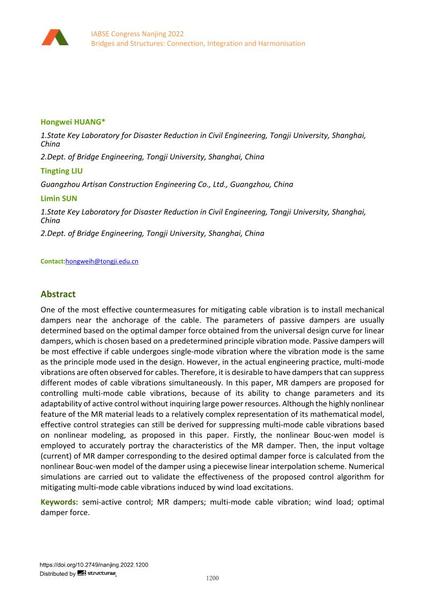Semi-active Control of Cable Vibration Using MR Damper under Wind Loads

|
|
|||||||||||
Bibliographic Details
| Author(s): |
Hongwei Huang
(State Key Laboratory for Disaster Reduction in Civil Engineering, Tongji University, Shanghai, China; Dept. of Bridge Engineering, Tongji University, Shanghai, China)
Tingting Liu (Guangzhou Artisan Construction Engineering Co., Ltd., Guangzhou, China) Limin Sun |
||||
|---|---|---|---|---|---|
| Medium: | conference paper | ||||
| Language(s): | English | ||||
| Conference: | IABSE Congress: Bridges and Structures: Connection, Integration and Harmonisation, Nanjing, People's Republic of China, 21-23 September 2022 | ||||
| Published in: | IABSE Congress Nanjing 2022 | ||||
|
|||||
| Page(s): | 1200-1208 | ||||
| Total no. of pages: | 9 | ||||
| DOI: | 10.2749/nanjing.2022.1200 | ||||
| Abstract: |
One of the most effective countermeasures for mitigating cable vibration is to install mechanical dampers near the anchorage of the cable. The parameters of passive dampers are usually determined based on the optimal damper force obtained from the universal design curve for linear dampers, which is chosen based on a predetermined principle vibration mode. Passive dampers will be most effective if cable undergoes single-mode vibration where the vibration mode is the same as the principle mode used in the design. However, in the actual engineering practice, multi-mode vibrations are often observed for cables. Therefore, it is desirable to have dampers that can suppress different modes of cable vibrations simultaneously. In this paper, MR dampers are proposed for controlling multi-mode cable vibrations, because of its ability to change parameters and its adaptability of active control without inquiring large power resources. Although the highly nonlinear feature of the MR material leads to a relatively complex representation of its mathematical model, effective control strategies can still be derived for suppressing multi-mode cable vibrations based on nonlinear modeling, as proposed in this paper. Firstly, the nonlinear Bouc-wen model is employed to accurately portray the characteristics of the MR damper. Then, the input voltage (current) of MR damper corresponding to the desired optimal damper force is calculated from the nonlinear Bouc-wen model of the damper using a piecewise linear interpolation scheme. Numerical simulations are carried out to validate the effectiveness of the proposed control algorithm for mitigating multi-mode cable vibrations induced by wind load excitations. |
||||
| Keywords: |
wind load semi-active control MR dampers multi-mode cable vibration optimal damper force
|
||||
| Copyright: | © 2022 International Association for Bridge and Structural Engineering (IABSE) | ||||
| License: | This creative work is copyrighted material and may not be used without explicit approval by the author and/or copyright owner. |
||||
